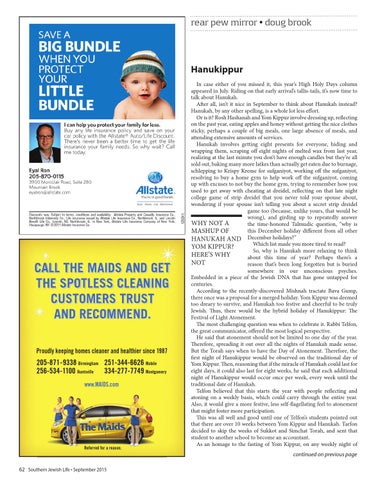rear pew mirror • doug brook
Hanukippur
CALL THE MAIDS AND GET THE SPOTLESS CLEANING CUSTOMERS TRUST AND RECOMMEND. Proudly keeping homes cleaner and healthier since 1987
205-871-9338 Birmingham 251-344-6626 Mobile 256-534-1100 Huntsville 334-277-7749 Montgomery www.MAIDS.com
Referred for a reason.
In case either of you missed it, this year’s High Holy Days column appeared in July. Riding on that early arrival’s tallis-tails, it’s now time to talk about Hanukah. After all, isn’t it nice in September to think about Hanukah instead? Hanukah, by any other spelling, is a whole lot less effort. Or is it? Rosh Hashanah and Yom Kippur involve dressing up, reflecting on the past year, eating apples and honey without getting the nice clothes sticky, perhaps a couple of big meals, one large absence of meals, and attending extensive amounts of services. Hanukah involves getting eight presents for everyone, hiding and wrapping them, scraping off eight nights of melted wax from last year, realizing at the last minute you don’t have enough candles but they’re all sold out, baking many more latkes than actually get eaten due to burnage, schlepping to Krispy Kreme for sufganiyot, working off the sufganiyot, resolving to buy a home gym to help work off the sufganiyot, coming up with excuses to not buy the home gym, trying to remember how you used to get away with cheating at dreidel, reflecting on that late night college game of strip dreidel that you never told your spouse about, wondering if your spouse isn’t telling you about a secret strip dreidel game too (because, unlike yours, that would be wrong), and girding up to repeatedly answer WHY NOT A the time-honored Talmudic question, “why is this December holiday different from all other MASHUP OF HANUKAH AND December holidays?” Which list made you more tired to read? YOM KIPPUR? So, why is Hanukah more relaxing to think HERE’S WHY about this time of year? Perhaps there’s a NOT reason that’s been long forgotten but is buried somewhere in our unconscious psyches. Embedded in a piece of the Jewish DNA that has gone untapped for centuries. According to the recently-discovered Mishnah tractate Bava Gump, there once was a proposal for a merged holiday. Yom Kippur was deemed too dreary to survive, and Hanukah too festive and cheerful to be truly Jewish. Thus, there would be the hybrid holiday of Hanukippur: The Festival of Light Atonement. The most challenging question was when to celebrate it. Rabbi Telfon, the great communicator, offered the most logical perspective. He said that atonement should not be limited to one day of the year. Therefore, spreading it out over all the nights of Hanukah made sense. But the Torah says when to have the Day of Atonement. Therefore, the first night of Hanukippur would be observed on the traditional day of Yom Kippur. Then, reasoning that if the miracle of Hanukah could last for eight days, it could also last for eight weeks, he said that each additional night of Hanukippur would occur once per week, every week until the traditional date of Hanukah. Telfon believed that this starts the year with people reflecting and atoning on a weekly basis, which could carry through the entire year. Also, it would give a more festive, less self-flagellating feel to atonement that might foster more participation. This was all well and good until one of Telfon’s students pointed out that there are over 10 weeks between Yom Kippur and Hanukah. Tarfon decided to skip the weeks of Sukkot and Simchat Torah, and sent that student to another school to become an accountant. As an homage to the fasting of Yom Kippur, on any weekly night of continued on previous page
62 Southern Jewish Life • September 2015
